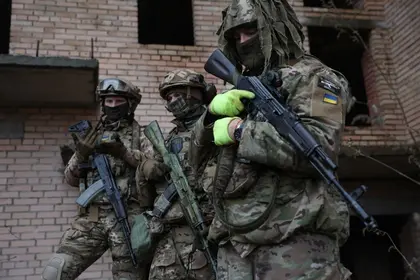Soldiers are battling trench foot while the rain and snow have turned roads to mud and ongoing power outages have led many to question how they will manage to endure the coming cold as winter descends on the frontlines in eastern Ukraine.
But despite the cold and miserable conditions in Donbas to the east, the Russians just keep coming, according to Ukrainian forces near the frontlines.
JOIN US ON TELEGRAM
Follow our coverage of the war on the @Kyivpost_official.
“They’re like zombies. You shoot them and more come constantly,” a 30-year-old Ukrainian soldier with the call sign Kit, which means whale, told AFP.
- View the most up-to-date Ukraine news articles published today.
- View the most up-to-date Ukraine news articles published today.
- Russian Losses
Fighting on the front is only getting colder and more wet as the first snows have dusted the area and melted in addition to the sheets of freezing rain that drench the region almost daily.
“I’m suffering from the rain. We literally live in a marsh. Yesterday, I went to the hospital and looked like a big pile of mud.” said Kit.
Other soldiers told AFP that many troops were beginning to suffer from trench foot, a medical condition associated with swelling and numbness of the feet that also afflicted large numbers of soldiers in World War I.
“Infantry is the heart of every army and they suffer a lot,” Taller, the nickname for a 24-year-old fighting with a special forces unit in Donbas, told AFP following a recent training session.
“Their boots are always wet. They sleep very sporadically. Sometimes they have trouble with food supplies,” he added.

What if Russia Wins?
– Morale ‘extremely high’-
To help fight back against the arrival of winter, volunteers near the front have organised sprawling depots full of donated supplies that are provided to nearby units.
At one distribution centre in the city of Sloviansk, Slava Kovalenko said he hands out thousands of kilogrammes of goods a week, including clothing, basic medications, candles and canned food.
“Warm clothes are in high demand, long underwear, flu medicine, medicinal tea, pain killer ointment. Everybody comes here asking for that,” said Kovalenko.
And as the temperatures drop, the fighting in Donbas remains unrelenting.
On Thursday, on the outskirts of Bakhmut the sun managed to break through the overcast sky as lines of Ukrainian artillery batteries, infantry fighting vehicles and tanks dotted the rolling steppe near the frontline.
The sound of the battle was deafening as an infantry reserve fighter with the call sign Rambo cast an eye over the ensuing clash from a hill top position.
“We’re getting ready for a counteroffensive,” he told AFP while taking pulls on a vape pen.
Following the retreat of the Russian military from the southern city of Kherson earlier this month, Donbas has become the primary theatre of combat in Ukraine, with the frontlines now shortened and the density of forces increased.
“Our morale is extremely high,” said another soldier nicknamed IT Guy.
“In this area, we increased the number of our troops and increased our offensive movements.”
– ‘We will freeze’ –
With mounting losses on the battlefield, the Kremlin has doubled down on attacking Ukraine’s infrastructure, sending waves of drones and cruise missiles targeting power plants and basic utilities sites.
Power outages are now frequent as electricity is rationed, forcing hospitals in the area to rely more on generators to keep the lights on as they treat soldiers and civilians injured near the frontlines.
“The way they fight and target civil infrastructure, it can cause nothing but fury,” said Oleksiy Yakovlenko, the chief administrator at a hospital in Kramatorsk.
But even as blackouts become more frequent, Yakovlenko promised that his resolve remains unwavering.
“If they expect us to fall on our knees and crawl to them it won’t happen,” Yakovlenko told AFP.
For the civilians caught in the crossfire, the coming winter only promises more pain after their communities were largely left in ruins following the summer fighting season.
In Lyman, the few remaining residents in the city rely largely on handouts from humanitarian aid groups and firewood to heat their homes.
Electricity and gas have been mostly nonexistent in their apartment blocks since the spring, with power only coming in sporadic bursts.
Most are too poor and old to move elsewhere on their own.
“I don’t know how we will make it through the winter,” said Lyman resident Tatiana Kutepova, 62.
“Maybe we will freeze and they will take us to Maslyakivka, our cemetery.”
You can also highlight the text and press Ctrl + Enter






